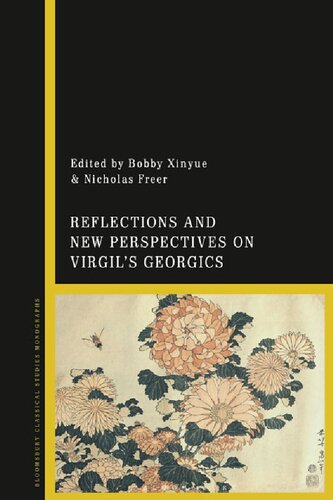Product desciption
Reflections And New Perspectives On Virgils Georgics Bobby Xinyue Nicholas Freer Editors by Bobby Xinyue; Nicholas Freer (editors) 9781350070516, 9781350070547, 1350070513, 1350070548 instant download after payment.
Virgil’s Georgics, the most neglected of the poet’s three major works, is brought to life and infused with fresh meanings in this dynamic collection of new readings. The Georgics is shown to be a rich field of inherited and varied literary forms, actively inviting a wide range of interpretations as well as deep reflection on its place within the tradition of didactic poetry.
The essays contained in this volume – contributed by scholars from Australia, Europe and North America – offer new approaches and interpretive methods that greatly enhance our understanding of Virgil’s poem. In the process, they unearth an array of literary and philosophical sources which exerted a rich influence on the Georgics but whose impact has hitherto been underestimated in scholarship. A second goal of the volume is to examine how the Georgics – with its profound meditations on humankind, nature, and the socio-political world of its creation – has been (re)interpreted and appropriated by readers and critics from antiquity to the modern era. The volume opens up a number of exciting new research avenues for the study of the reception of the Georgics by highlighting the myriad ways in which the poem has been understood by ancient readers, early modern poets, explorers of the ‘New World’, and female translators of the twentieth and twenty-first centuries.
This collected volume has two objectives: first, to offer thoughtful, new readings of Virgil’s Georgics which reflect the major scholarly concerns and activities of Virgilian studies since the turn of the twenty-first century; and second, to present innovative and underutilized perspectives – approaches, interpretive methods, and ways of seeing the Georgics – which in turn will lead to further explorations of the poem. The essays in this volume demonstrate that the enduring appeal of the Georgics derives from the breadth of Virgil’s intellectual activity, the richness and depth of the poem’s engagement with its creative environment, and the myriad ways in which the poem is reflected in the works of others. By identifying and building on emergent trends in recent Classical scholarship, this collection of essays significantly augments our understanding of what the Georgics says about its subject matter, its medium, its time, and its legacy. As we illustrate throughout this volume, the Georgics actively invites reflections on the relationship between reader and addressee, content and meaning, message and medium, idealism and reality. Indeed, we take the view that the poem’s exploration of these relationships lies at the heart of its inexhaustible interpretive possibilities. The volume also opens up exciting new research avenues for the study of the reception of the Georgics by highlighting the numerous ways in which the poem has been understood by ancient readers, early modern poets, explorers of the ‘New World’, and female translators of the twentieth and twenty-first centuries.


